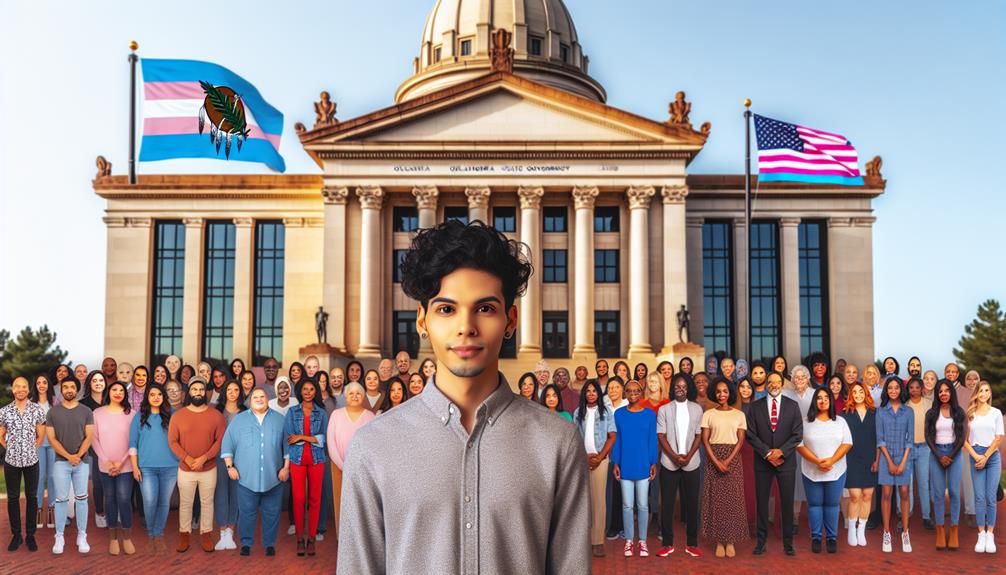Oklahoma Transgender State of Affairs


Table of Contents
ToggleAmidst the sweeping plains and rolling hills of Oklahoma, the transgender state of affairs is a subject of intense debate and concern. As the dust settles on recent legislative decisions, the implications for transgender individuals in the state have come under scrutiny.
With a backdrop of legal challenges, healthcare access, and discrimination, the landscape of transgender rights in Oklahoma is at a pivotal crossroads. As the discussion unfolds, it becomes clear that the implications of these developments extend far beyond state lines, prompting a closer examination of the broader implications and the resilience of the transgender community in the face of adversity.
Amidst legal challenges for transgender rights, Governor Kevin Stitt's executive order in Oklahoma has sparked widespread concern and debate, impacting the ability of transgender individuals to access gender-affirming care and participate in certain activities.
Stitt's order directs state agencies to adopt narrow definitions of male and female, limiting the rights of transgender individuals. This move has drawn criticism from groups like the American Civil Liberties Union, who argue that such measures perpetuate discrimination against transgender people. The executive order prohibits transgender women and girls from using women-only spaces and playing on female sports teams, further marginalizing an already vulnerable community.
Moreover, Oklahoma has also passed legislation making it a felony for doctors to provide gender-affirming healthcare to transgender minors. This means that health care professionals could face severe legal consequences for providing essential care to transgender youth.
Governor Kevin Stitt's recent executive order and legislative actions in Oklahoma have raised concerns about the accessibility and affordability of healthcare for transgender individuals in the state. Transgender individuals in Oklahoma may face challenges accessing gender-affirming healthcare due to legal restrictions on certain medical procedures for minors.
The ban on gender-affirming care for minors in Oklahoma may limit access to necessary treatments such as puberty suppression therapy and hormone therapies for transgender youth. Healthcare affordability for transgender individuals in Oklahoma can be impacted by limitations on insurance coverage for gender-affirming treatments and procedures.
The ban on gender-affirming care may contribute to disparities in healthcare access for transgender youth, affecting their well-being and ability to live authentically. Legal and policy barriers to gender-affirming healthcare in Oklahoma may necessitate advocacy efforts to promote inclusive and accessible healthcare options for transgender individuals.
It's crucial to address these challenges to ensure that all individuals, regardless of gender identity, have access to the care they need.
Discrimination and hate crimes against transgender individuals in Oklahoma create significant barriers to accessing essential rights and services. Despite ongoing advocacy efforts, transgender individuals in Oklahoma often face discrimination in employment, housing, healthcare, and public accommodations, leading to higher rates of poverty and homelessness.
The situation is particularly dire for transgender women of color, who are disproportionately targeted in hate crimes, fostering a climate of fear and insecurity. The lack of legal protections and societal acceptance exposes transgender individuals to higher levels of violence and harassment, impacting their physical and mental well-being.
In a positive development, Governor Stitt signed a bill prohibiting discrimination and hate crimes against transgender individuals, which is a crucial step towards protecting their rights and safety. This bill also imposes felony charges for perpetrators of hate crimes, sending a strong message against such reprehensible acts.
However, while this legislative action is a significant milestone, more comprehensive efforts are needed to address the systemic issues contributing to discrimination and hate crimes. By focusing on policy changes, education, and community support, Oklahoma can work towards creating a safer and more inclusive environment for transgender individuals.
Despite the challenges faced by the transgender community in Oklahoma, there's a remarkable spirit of progress and resilience that continues to shine through.
The latest state policies and laws have posed significant hurdles for transgender individuals, particularly adolescents, seeking gender transition and access to affirming healthcare. However, the community has shown remarkable strength and determination in the face of these obstacles.
Here are some key points that reflect the progress and resilience in the transgender community:
These efforts underscore the community's resilience and determination to overcome the barriers and create a more inclusive and affirming environment for all individuals.
Advocacy and allyship efforts play a crucial role in supporting the transgender community in Oklahoma, fostering understanding and promoting inclusive policies and healthcare access.
Last year, the debate around transgender individuals playing on female sports teams sparked discussions about the rights and inclusion of transgender people. Organizations like the ACLU of Oklahoma and Lambda Legal are actively working to defend the rights of transgender individuals in the state.
Allies can contribute to advocacy efforts by staying informed about the legislative landscape and engaging in conversations to promote understanding and acceptance of transgender rights.
Supporting and amplifying the voices of transgender individuals and advocating for inclusive policies and healthcare access are essential components of allyship.
Part of helping transgender individuals is recognizing that healthcare is a critical aspect of their well-being and ensuring they have access to affirming care.
It's important to seek out resources and organizations that provide support for transgender individuals and to actively participate in advocacy efforts for transgender rights in Oklahoma.
Yes, it's legal to change your gender in Oklahoma. The process involves obtaining a court order for the gender change and name change, if applicable.
Providing the necessary documentation, such as a notarized statement from a physician for gender change, is also required.
Once the court order is obtained, individuals can then proceed with updating their driver's license and obtaining an amended birth certificate with the new gender marker.
The new Women's Law in Oklahoma, signed by Governor Kevin Stitt, defines female as a person with a biological reproductive system designed to produce ova. It also defines male as an individual with a biological reproductive system designed to fertilize the ova of a female.
This definition of female and male has sparked controversy and debate. Critics argue that it perpetuates discrimination and harms transgender individuals. They believe that these definitions fail to recognize and respect gender identity.
The Women's Law, along with other recent legislation, has brought attention to the ongoing debate around transgender rights and healthcare access. This debate centers on issues such as legal recognition, healthcare coverage, and the protection of transgender individuals from discrimination.
Yes, the Oklahoma judge declined to block the felony ban on gender-affirming care for minors under 18.
The ban, signed into law by Governor Kevin Stitt, prohibits healthcare professionals from providing surgeries, puberty blocking medication, and hormone treatments to transgender youth.
This decision has sparked nationwide concern about the healthcare access for transgender individuals.
The ban limits transgender youth in Oklahoma from accessing medically necessary care, hindering their ability to live authentically and pursue their dreams.
Governor Kevin Stitt is the governor responsible for The Women's Bill of Rights in Oklahoma. The executive order, signed by him, directs state agencies to adopt narrow definitions of male and female.
It defines female as a person with a biological reproductive system designed to produce ova and male as an individual with a biological reproductive system designed to fertilize the ova of a female.
This has sparked controversy and debate, with critics arguing that these measures perpetuate discrimination and harm transgender individuals.
As Oklahoma grapples with legal challenges and discrimination against the transgender community, there's also a growing movement of advocacy and allyship.
Despite the barriers they face, transgender individuals are resilient and continue to push for progress and acceptance.
Healthcare access and affordability remain crucial issues, but the community isn't backing down.
With ongoing efforts to promote understanding and equality, Oklahoma's transgender state of affairs is a battleground for change and compassion.
 Featured PostsJanuary 3, 2026Transitioning the Mind: The Emotional Labor of Becoming Yourself
Featured PostsJanuary 3, 2026Transitioning the Mind: The Emotional Labor of Becoming Yourself Featured PostsJanuary 2, 2026Beyond Barriers: The Resilient Journey of Transgender Youth
Featured PostsJanuary 2, 2026Beyond Barriers: The Resilient Journey of Transgender Youth Activism and ChangeJanuary 2, 2026The Price of Safety: Fleeing Anti-Trans Laws in the Lone Star State
Activism and ChangeJanuary 2, 2026The Price of Safety: Fleeing Anti-Trans Laws in the Lone Star State Featured PostsDecember 31, 2025Beyond the Headlines: The Full Impact of New Anti-Trans Laws
Featured PostsDecember 31, 2025Beyond the Headlines: The Full Impact of New Anti-Trans Laws